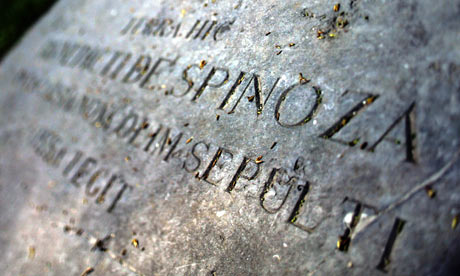
Although Baruch Spinoza is one of the great thinkers of the European philosophical tradition, he was not a professional scholar – he earned his modest living as a lens grinder. So, unlike many thinkers of his time, he was unconstrained by allegiance to a church, university or royal court. He was free to be faithful to the pursuit of truth. This gives his philosophy a remarkable originality and intellectual purity – and it also led to controversy and charges of heresy. In the 19th century, and perhaps even more recently, "Spinozist" was still a term of abuse among intellectuals.
In a sense, Spinoza was always an outsider – and this independence is precisely what enabled him to see through the confusions, prejudices and superstitions that prevailed in the 17th century, and to gain a fresh and radical perspective on various philosophical and religious issues. He was born, in 1632, to Jewish Portuguese parents who had fled to Amsterdam to escape persecution, so from the very beginning he was never quite a native, never completely at home. Although Spinoza was an excellent student in the Jewish schools he attended, he came to be regarded by the leaders of his community as a dangerous influence. At the age of 24 he was excluded from the Amsterdam synagogue for his "intolerable" views and practices.
Spinoza's most famous and provocative idea is that God is not the creator of the world, but that the world is part of God. This is often identified as pantheism, the doctrine that God and the world are the same thing – which conflicts with both Jewish and Christian teachings. Pantheism can be traced back to ancient Greek thought: it was probably advocated by some pre-Socratic philosophers, as well as by the Stoics. But although Spinoza – who admired many aspects of Stoicism – is regarded as the chief source of modern pantheism, he does, in fact, want to maintain the distinction between God and the world.
His originality lies in the nature of this distinction. God and the world are not two different entities, he argues, but two different aspects of a single reality. Over the next few weeks we will examine this view in more detail and consider its implications for human life. Since Spinoza presents a radical alternative to the Cartesian philosophy that has shaped our intellectual and cultural heritage, exploring his ideas may lead us to question some of our deepest assumptions.
One of the most important and distinctive features of Spinoza's philosophy is that it is practical through and through. His ideas are never merely intellectual constructions, but lead directly to a certain way of life. This is evidenced by the fact that his greatest work, which combines metaphysics, theology, epistemology, and human psychology, is called Ethics. In this book, Spinoza argues that the way to "blessedness" or "salvation" for each person involves an expansion of the mind towards an intuitive understanding of God, of the whole of nature and its laws. In other words, philosophy for Spinoza is like a spiritual practice, whose goal is happiness and liberation.
The ethical orientation of Spinoza's thought is also reflected in his own nature and conduct. Unlike most of the great philosophers, Spinoza has a reputation for living an exemplary, almost saintly life, characterised by modesty, gentleness, integrity, intellectual courage, disregard for wealth and a lack of worldly ambition. According to Bertrand Russell, Spinoza was "the noblest and most lovable of the great philosophers". Although his ideas were despised by many of his contemporaries, he attracted a number of devoted followers who gathered regularly at his home in Amsterdam to discuss his philosophy. These friends made sure that Spinoza's Ethics was published soon after his death in 1677.

